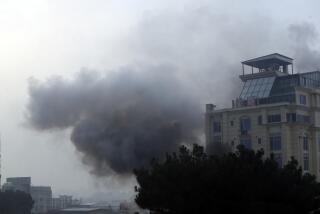Fresh attack on Egyptian tourism as suicide blast, gunfire target Luxor
- Share via
Reporting from Cairo — In a stark new threat to Egypt’s fragile tourist industry, attackers on Wednesday tried to blast their way into one of the country’s best-known visitor attractions, the monumental Temple of Karnak in Luxor.
The assault — a suicide explosion and fierce exchange of gunfire — left as many as three attackers dead and at least five other people injured, Egyptian officials and media reports said. It came a week after unidentified gunmen killed two tourist police in a drive-by shooting near the Pyramids of Giza outside Cairo.
There was no immediate claim of responsibility for the two attacks. However, taken together they raised the specter of an organized campaign by militants to target the country’s sagging but still lucrative tourism sector, which lately had been showing signs of recovery.
Luxor, in southern Egypt, is one of the country’s treasure houses of antiquities. The Temple of Karnak, bordered by the modern city, is a sprawling complex of towering stone pillars, intricate carvings and immense statuary.
The official Middle East News Agency quoted a spokesman for the Health Ministry, Hosszam Abdul Ghaffar, as saying two attackers were killed in an exchange of fire and the explosion, and that a third died later at the hospital from his wounds. But officials later said the badly mutilated condition of the remains made it difficult to say with certainty that two attackers, rather than a single bomber, had died at the scene.
The Health Ministry reported that three people were injured. However, several Egyptian media reports put the number at five and said at least two were believed to be police officers.
Egyptian authorities credited security forces with preventing what could have been a catastrophic strike.
“Three attackers armed with bombs and weapons tried to cross the security cordon at Karnak Temple, but were faced by security forces who foiled their attempt,” the Interior Ministry said in a statement. It also confirmed the deaths of three attackers.
There was no indication that any visitors were close to the explosion or firefight. The complex’s parking lot and entry hall, flanked by shops and vendors’ stalls, sit several hundred yards from the closest entry point to the vast ruins.
The Karnak site is a popular one, but officials quoted by the Associated Press said there were only a handful of visitors and guides in the city-sized complex at the time of the attack. Although summer has not yet begun, daytime temperatures in southern Egypt are routinely above 90 degrees.
Luxor in 1997 was the scene of Egypt’s deadliest attack targeting visitors, when Islamist gunmen massacred more than 60 people, most of them foreign tourists. That attack took place at the Temple of Hatshepsut, on the opposite bank of the Nile, where many pharaonic tombs and temples are located.
The June 3 police shooting near the pyramids came just two days after the government had touted an improving picture for the tourist industry, which all but collapsed following the 2011 uprising that forced out longtime autocratic President Hosni Mubarak.
While still not approaching prerevolution numbers, more visitors arrived in the first quarter of this year than the same period last year, the Egyptian Embassy in Washington said.
Islamic militants, angry over the ouster nearly two years ago of Islamist President Mohamed Morsi and a harsh crackdown that killed hundreds of his followers, have mainly aimed strikes at security forces and police and military installations. But a series of small bombings in recent months targeted commercial establishments, many of them with overseas ties, in an apparent effort to discourage investors.
Morsi’s Muslim Brotherhood, which was declared a terrorist organization, insists it is committed to nonviolence, but other groups have dedicated themselves to bombings and other attacks aimed at undermining current President Abdel Fattah Sisi, who as defense minister led the popularly supported coup that deposed Morsi.
Sisi has jailed tens of thousands of suspected Islamists, and Morsi himself is facing an array of charges. He has received a provisional death sentence in one of the cases against him, and a court is to decide next week on whether to affirm or reject the verdict.
Special correspondent Hassan reported from Cairo and staff writer King from Istanbul.
Follow @laurakingLAT on Twitter for news out of the Middle East
More to Read
Sign up for Essential California
The most important California stories and recommendations in your inbox every morning.
You may occasionally receive promotional content from the Los Angeles Times.









